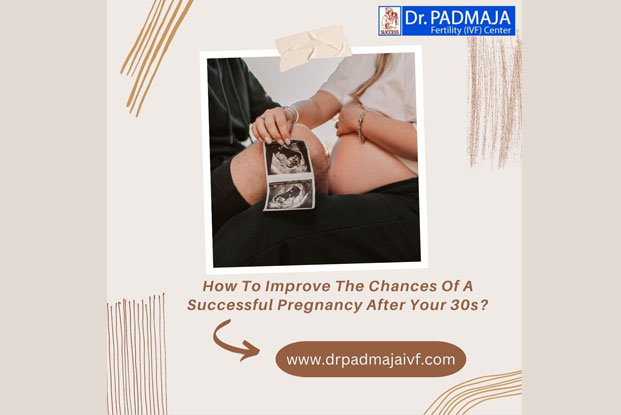How To Improve The Chances Of A Successful Pregnancy After Your 30s?
Navigating the journey to parenthood can be a thrilling yet challenging experience, especially for women conceiving in their 30s. While it is true that fertility declines with age, a healthy pregnancy after 30 is entirely possible with the right approach. Here’s a comprehensive guide to improving your chances of a successful pregnancy in your 30s, focusing on key strategies and tips. https://www.drpadmajaivf.com/
Understanding Advanced Maternal Age
Advanced maternal age typically refers to women who are pregnant at 35 or older. While this term might sound daunting, it simply means that extra care and attention are needed to ensure a healthy pregnancy. Understanding the implications of advanced maternal age is crucial in taking proactive steps towards a successful pregnancy. https://www.drpadmajaivf.com/
Boosting Fertility Naturally
One of the most effective ways to enhance your fertility is through natural methods. Boosting fertility naturally involves a combination of lifestyle changes, dietary adjustments, and mindful practices. Here are some tips:
1. Maintain a Healthy Diet
Consuming a balanced diet rich in fruits, vegetables, whole grains, and lean proteins can significantly impact your fertility. Foods rich in antioxidants, such as berries, nuts, and green leafy vegetables, help combat oxidative stress that can affect egg quality. https://www.drpadmajaivf.com/
2. Regular Exercise
Moderate exercise, such as walking, swimming, or yoga, can improve blood circulation, reduce stress, and help maintain a healthy weight – all crucial factors for fertility. https://www.drpadmajaivf.com/
3. Avoid Harmful Substances
Limiting or eliminating alcohol, caffeine, and tobacco use is essential. These substances can negatively affect fertility and overall health. https://www.drpadmajaivf.com/
Preconception Health
Prioritizing preconception health is vital when planning to conceive in your 30s. This involves a series of health checks and lifestyle adjustments:
1. Medical Check-Up
Schedule a visit with your healthcare provider to discuss your plans and undergo necessary screenings. This helps identify and manage any potential health issues that could affect your pregnancy. https://www.drpadmajaivf.com/
2. Prenatal Vitamins
Start taking prenatal vitamins even before you conceive. Folic acid, iron, and calcium are particularly important for supporting a healthy pregnancy and preventing birth defects. https://www.drpadmajaivf.com/
3. Manage Stress
High levels of stress can impact your ability to conceive. Practices like meditation, deep breathing exercises, and adequate rest can help manage stress effectively. https://www.drpadmajaivf.com/
Ovulation Tracking
Tracking your ovulation is crucial for understanding your most fertile days. This can be done through various methods:
1. Basal Body Temperature
Measuring your basal body temperature daily can help identify the slight rise that occurs after ovulation. https://www.drpadmajaivf.com/
2. Ovulation Predictor Kits
These kits detect the surge in luteinizing hormone (LH) that precedes ovulation, providing a more precise window for conception.
3. Cervical Mucus Monitoring
Observing changes in cervical mucus can also indicate ovulation. Around ovulation, cervical mucus becomes clear, stretchy, and egg-white in consistency. https://www.drpadmajaivf.com/
Lifestyle Adjustments for a Healthy Pregnancy After 30
Adopting a healthy lifestyle is paramount when aiming for a healthy pregnancy after 30. Here are additional tips to consider:
1. Adequate Sleep
Aim for 7-9 hours of quality sleep each night to support overall health and hormonal balance. https://www.drpadmajaivf.com/
2. Hydration
Staying well-hydrated is essential for maintaining optimal body functions, including fertility. https://www.drpadmajaivf.com/
3. Avoid Environmental Toxins
Minimize exposure to harmful chemicals and pollutants, which can affect reproductive health. https://www.drpadmajaivf.com/
Conclusion
Conceiving in your 30s comes with its own set of challenges and rewards. By focusing on preconception health, boosting fertility naturally, tracking ovulation, and making informed lifestyle choices, you can significantly improve your chances of a successful pregnancy. Remember, every journey is unique, so stay positive and proactive as you navigate this exciting chapter of your life. https://www.drpadmajaivf.com/
Top Foods to Help Men and Women in Their 30s Get Pregnant Quickly
Proper nutrition plays a vital role in enhancing fertility for both men and women. Here are some of the top foods that can boost your chances of getting pregnant quickly:
Foods to Include
1. Leafy Greens
Spinach, kale, and other leafy greens are rich in folate, a B vitamin crucial for reproductive health. Folate helps improve egg quality in women and sperm quality in men. https://www.drpadmajaivf.com/
2. Berries
Blueberries, strawberries, and raspberries are packed with antioxidants, which help protect your reproductive cells from damage and aging.
3. Nuts and Seeds
Almonds, walnuts, flaxseeds, and chia seeds provide essential fatty acids, vitamins, and minerals that support hormone production and reproductive health. https://www.drpadmajaivf.com/
4. Whole Grains
Brown rice, quinoa, and whole wheat bread are excellent sources of complex carbohydrates, which help maintain stable blood sugar levels and provide sustained energy. https://www.drpadmajaivf.com/
5. Lean Proteins
Chicken, turkey, beans, and lentils offer high-quality protein necessary for tissue repair and hormone production.
6. Dairy Products
Full-fat dairy products like yogurt, milk, and cheese contain calcium and vitamin D, which are important for hormonal balance and bone health. https://www.drpadmajaivf.com/
7. Oily Fish
Salmon, sardines, and mackerel are rich in omega-3 fatty acids, which support sperm health and improve blood flow to the reproductive organs.
8. Citrus Fruits
Oranges, grapefruits, and lemons are high in vitamin C, which can improve sperm motility and protect eggs from oxidative stress. https://www.drpadmajaivf.com/
9. Avocados
Avocados are loaded with healthy fats, vitamin E, and potassium, all of which contribute to hormonal health and improve the chances of conception. https://www.drpadmajaivf.com/
10. Eggs
Eggs are a good source of protein and choline, which supports fetal brain development and reproductive health.
Foods to Avoid
1. Trans Fats
Found in many processed and fried foods, trans fats can negatively affect insulin sensitivity and ovarian function. https://www.drpadmajaivf.com/
2. High-Mercury Fish
Avoid fish like swordfish, king mackerel, and shark, which contain high levels of mercury that can harm reproductive health and fetal development. https://www.drpadmajaivf.com/
3. Excessive Caffeine
While moderate caffeine consumption is generally safe, excessive intake can interfere with fertility and increase the risk of miscarriage. Limit to one or two cups of coffee per day.
4. Alcohol
Both men and women should limit alcohol consumption when trying to conceive, as it can affect hormone levels and decrease fertility. https://www.drpadmajaivf.com/
5. Refined Carbohydrates
Foods like white bread, pastries, and sugary snacks can cause spikes in blood sugar and insulin, which may disrupt ovulation.
6. Processed Meats
Deli meats, hot dogs, and bacon often contain preservatives and additives that can negatively impact reproductive health. https://www.drpadmajaivf.com/
7. Soy Products
In large amounts, soy products can interfere with hormone levels due to their phytoestrogen content. Consume soy in moderation.
8. High-Sugar Foods
Sodas, candies, and other high-sugar foods can lead to insulin resistance and hormonal imbalances, affecting fertility. https://www.drpadmajaivf.com/
9. Artificial Sweeteners
Certain artificial sweeteners, like aspartame, may negatively impact fertility and should be consumed with caution.
10. High-Sodium Foods
Excessive salt intake can lead to high blood pressure and dehydration, which can affect overall health and fertility. https://www.drpadmajaivf.com/
By incorporating these fertility-boosting foods into your diet and avoiding those that can harm reproductive health, you can create a solid foundation for a healthy pregnancy. A balanced, nutritious diet, combined with a healthy lifestyle, can significantly improve your chances of conceiving in your 30s. https://www.drpadmajaivf.com/
About The Author :

Frequently Asked Questions (faqs)
Is it more difficult to get pregnant after 30?
Yes, fertility naturally declines with age. Women over 30 may find it takes longer to conceive compared to those in their 20s. However, many women in their 30s and beyond successfully conceive.
Should I take any supplements?
Prenatal vitamins, particularly those containing folic acid, can be beneficial. Consult with your healthcare provider for personalized recommendations.
How often should we try to conceive?
Engage in regular intercourse, especially during the ovulation period. Tracking ovulation can help identify the most fertile days.
When should I see a fertility specialist?
If you’re over 35 and have been trying to conceive for six months without success, it’s advisable to consult a fertility specialist. For those under 35, the recommendation is typically after a year of trying.
Are there any medical treatments to help with fertility?
Yes, treatments such as medication to stimulate ovulation, intrauterine insemination (IUI), and in vitro fertilization (IVF) are available. A fertility specialist can provide guidance based on your specific situation.
Can lifestyle changes really make a difference?
Absolutely. Maintaining a healthy lifestyle can improve overall reproductive health, increasing the chances of a successful pregnancy.
Does age affect the health of the pregnancy and baby?
There is a higher risk of complications like gestational diabetes, preeclampsia, and chromosomal abnormalities with advancing maternal age. Regular prenatal care is crucial to monitor and manage these risks.

